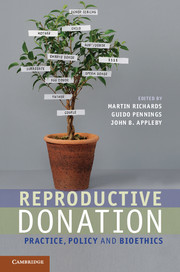Book contents
- Frontmatter
- Contents
- Contributors
- Acknowledgements
- 1 Introduction
- 2 The biology of donation
- 3 Ethics for reproductive donation
- 4 Parenthood – whose right is it anyway?
- 5 Reproductive donation
- 6 UK and US perspectives on the regulation of gamete donation
- 7 Gamete and embryo donation
- 8 The legal and ethical regulation of transnational donation
- 9 Balancing ethical criteria for the recruitment of gamete donors
- 10 Challenges in intra-family donation
- 11 ARTs and the single parent
- 12 Reproductive donation and justice for gay and lesbian couples
- 13 Is disclosure in the best interests of children conceived by donation?
- 14 Identifiable donors and siblings
- 15 Ethical issues in embryo donation
- 16 Reproduction through surrogacy
- 17 Some conclusions regarding the interaction of normative and descriptive elements in reproductive donation
- Index
- References
9 - Balancing ethical criteria for the recruitment of gamete donors
Published online by Cambridge University Press: 05 August 2012
- Frontmatter
- Contents
- Contributors
- Acknowledgements
- 1 Introduction
- 2 The biology of donation
- 3 Ethics for reproductive donation
- 4 Parenthood – whose right is it anyway?
- 5 Reproductive donation
- 6 UK and US perspectives on the regulation of gamete donation
- 7 Gamete and embryo donation
- 8 The legal and ethical regulation of transnational donation
- 9 Balancing ethical criteria for the recruitment of gamete donors
- 10 Challenges in intra-family donation
- 11 ARTs and the single parent
- 12 Reproductive donation and justice for gay and lesbian couples
- 13 Is disclosure in the best interests of children conceived by donation?
- 14 Identifiable donors and siblings
- 15 Ethical issues in embryo donation
- 16 Reproduction through surrogacy
- 17 Some conclusions regarding the interaction of normative and descriptive elements in reproductive donation
- Index
- References
Summary
Introduction
Patients and clinics are constantly searching for donors. The increasing gap between supply and demand in most countries shows beyond doubt that the current systems are unable to attract a sufficient number of donors. The first suggestion for a solution is always the same: let’s pay. However, payment for body material is, at least in Europe, generally rejected on ethical grounds. Several alternative modes of compensation are currently applied. Still, the efforts made by clinics and/or governments to increase the donor pool are fairly limited. In order to curb commercialization, a number of countries do not allow clinics to take their own initiatives to attract donors. This entails that the task lies completely with the government. However, compared to the campaigns for blood and organs, governments show very little interest in organizing widespread awareness campaigns for gamete donation. Moreover, the rare campaigns that are set up are so little advertised that they might as well not be done. Only seldom are special organizations (such as the National Gamete Donation Trust in the UK) set up to alleviate the shortage of gamete donors. The most likely explanation for this reticence is that most governments and responsible institutions are not convinced of the moral status of the procedure and as a consequence do not want to associate themselves with this topic.
The practice of gamete donation is a complex system in which multiple ethical rules, legal restrictions and medical facts intermingle. Things are further complicated by the fact that there are many different types of donors. The different categories are based on dimensions with ethical, social and psychological consequences: gamete type (oocyte and sperm donors), anonymity (known, identifiable and anonymous donors) and remuneration (volunteer, commercial and patient donors) (Purewal and van den Akker, 2009). Given space restrictions, we will focus on the major findings and trends.
- Type
- Chapter
- Information
- Reproductive DonationPractice, Policy and Bioethics, pp. 150 - 167Publisher: Cambridge University PressPrint publication year: 2012
References
- 7
- Cited by



